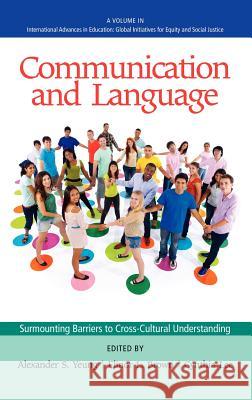Communication and Language: Surmounting Barriers to Cross-Cultural Understanding (Hc) » książka
Communication and Language: Surmounting Barriers to Cross-Cultural Understanding (Hc)
ISBN-13: 9781617359453 / Angielski / Twarda / 2012 / 420 str.
Communication and Language: Surmounting Barriers to Cross-Cultural Understanding (Hc)
ISBN-13: 9781617359453 / Angielski / Twarda / 2012 / 420 str.
(netto: 417,35 VAT: 5%)
Najniższa cena z 30 dni: 431,97
ok. 30 dni roboczych.
Darmowa dostawa!
Communication and Language play a foundational role in the overall pursuit of equity and social justice in education. This volume does not take up the majority and dominant views which are especially visible in developments in the field of linguistic education and English language instruction. Rather, it travels the path less followed, to attend to the language and communication concerns of populations that possess little political and economic power and whose academic and social needs are often neglected. The volume attends to the role of language acquisition in "levelling the playing field" to enable ALL students to develop into contented family members, good neighbours, and productive citizens in an increasingly diverse and global society. The issue takes on far greater importance, as it gradually comes to light that the capacity for language corresponds to and even implements the ability to interrelate with others. Far from being a mere utilitarian tool this is now appreciated as constituting the realm of abilities to take the position of the other, to share a field of meaning, and to project and pursue truly humane and indeed inter-humane attitudes and goals. In this light communication and language, whether verbal or preverbal, constitute the field in which one first attains and progressively evolves one's humanity. In this volume scholars from ten different countries examine issues related to the influence of language and communication patterns on equity and social justice in the lives of disadvantaged and marginalized populations around the globe (i.e., educational opportunities, community stability, economic prospects, and political power). Critical issues addressed include: education in traditional, national, or Western languages; language integration through dialects and code switching; non-verbal academic engagement through art, signing, and photography; cross-cultural engagement through language equity in higher education; and the influence of Western language acquisition on the self-concepts of disadvantaged students. As the succession of sections in this volume makes clear, success in the realization of language and communication abilities is not simple. Rather it reflects human life and interaction in all its complexity.











